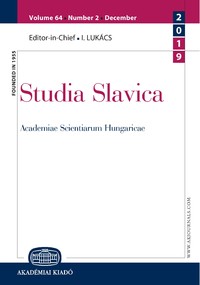Prostorne modulacije i dezeni materija • Prilozi za tumačenje poezije Janoša Siverija
Space Modulations And Patterns of Matter (Reflections on the Poetry of János Sziveri)
Author(s): Zoltán VirágSubject(s): Croatian Literature
Published by: Akadémiai Kiadó
Keywords: minority literature; Yugoslavia; collectivity; identity; corporeality; sick- ness; geobiography; Pannonism
Summary/Abstract: In this paper, János Sziveri’s poetry is studied from the perspective of associative plays based on matter-grouping and landscape visions. There was a productive correspondence, as the poet himself underlined it, between him and Vasko Popa’s works. The consonance between the book plans and the cycles of poems by Vasko Popa dedicated to the decom- position and recomposition of different matters and remains and the series of Sziveri’s texts are secured by the stock of biological limitations and tactile sensations. The processes of focusing on different bodies and moving from body to body and the excess of neuro- transmission as well as the desire for gratification are most efficiently distributed by the singular or plural first person. The Vasko Popa-esque radiation of life conditions extending beyond instrumentalized functioning and existence based on imitation echoes in Sziveri’s landscape descriptions by intensifying the creative potential of fixed stance and mobility. The antipoetics and the cyclical planning of the texts of the Serbian author with some Ro- manian ancestors in his family tree were properly cultivated and elevated by his Hungarian- speaking companion. Francis Ponge’s art can be considered as their literary precursor. Almost anything that can be told about water, fauna, flora, and the natural cycle, about the sea, shells, snails, pebbles, bones, and oranges, is told in Le parti pris des choses (1942), Ponge’s prose-poem cycle, which prevailed in the works of the well-informed Vasko Popa and, through Popa, in Sziveri’s texts as well. Sziveri’s criticism of targeting the patterns of social viability of South-Eastern Euro- pean repressive practices and collective false consciousness drowning in platitudes is ac- companied by topographic scenery and ethnic diversity which accumulated landscape sur- faces, fragments, and neighbourhoods framed by the Danube, Tisza, and Bega rivers as the scenes of geospecific identity. Comparing existential calculations, describing the shrinking of an ill body – these can be considered as a perceptual Pannonism of a subject observing and recording its direct impressions precisely and accurately. Clinging onto the love of life, self-defence supplied by background knowledge about the countryside – as if all these were representing the escapist way of hiding, disguise, and diversion. Being doomed to live as an outcast, as a result of the status quo of regional co- existence officially prescribing homogeneity and of institutionalized incitement of feud, seems to be a dead certain conditioning of life. His attitude against any kind of quailing, his manner of shrugging off or making fun of regional fixed ideas and minority melodramas, bodily and linguistic ‘Babylonization’ coalesce into a polyphonic credo of a poet standing in the shade of wrecking and falling apart.
Journal: Studia Slavica Academiae Scientiarum Hungaricae
- Issue Year: 64/2019
- Issue No: 2
- Page Range: 431-440
- Page Count: 10
- Language: Croatian

